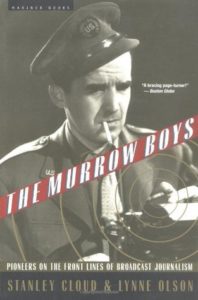Beth’s been listening to a book called “The Murrow Boys: Pioneers on the Front Lines of Broadcast Journalism.” Which means, because I’m interested in the subject, I’ve been listening to it, too. And it’s been enlightening, heartening, and disheartening all at once. Not to mention, entertaining.
I’ve always understood Edward R. Murrow as a broadcast journalism legend, but what I knew of him had mostly to do with his “See It Now” television news program. I somehow remained ignorant of “Murrow’s boys,” a team of news people who more or less created broadcast journalism with their coverage of the lead up and conduct of World War II. (A shout out is owed here. We wrote about visiting our friends Henry and Benita Black during a snow storm in New York City. It was during our lovely time together that Dr. Black, an avid history buff, recommended the book.)
“The Murrow Boys” is rife with names of broadcast news names I grew up with—Eric Sevareid and Howard K. Smith to name two. But more than that, these people all lived like “The Most Interesting Man in the World” of Dos Equus fame. Jumping out of planes just before they crash, evading cannibals (yes, really), surviving the London Blitz, more jumping out of planes. Waiting on a raft in the English Channel amongst U.S. forces and on land with British soldiers, waiting for D-Day to commence. At one point Eric Sevareid, who had been stationed in Paris (before Nazi occupation) was called to London on assignment. This, while his wife was on bed rest in the hospital waiting to deliver twins. While Sevareid was in London, his children were born. Shortly thereafter, the Nazis arrived. The hospital his wife and children were in lost power.
Sevareid managed to return to Paris and make his way down dark hospital hallways, until he found his wife holding their newborns, crying.
The bravery of the journalists, as well as their perspective in understanding that their plight was not nearly as arduous as the fighting forces they covered, was inspiring. As was the quality of their broadcasts. They grew up in print and knew how to write. And their dispatches were brilliant and gripping. Heartbreakingly, some of their best work was never heard because of how nascent the technology was.
All at a time when broadcast was treated as inherently inferior to conventional print journalism. And when the technology was new. Threatening. Unsettling.
Which reminded me once again of my favorite college class of all time. “The History of Communications” taught me that pretty much every communications technology advance has been treated as threatening—to order, to culture, to society. The printing press. Telegraph. The telephone was treated by many as a threat—a Boston newspaper lamented “the awful and irresponsible power it will give to the average mother-in-law who will be able to send her voice around the habitual world.”
Whew. There’s too much in that one to unpack. But, it does sound familiar, doesn’t it? Remember when we wrung our hands over the World Wide Web? That was quaint. Now it’s social media.
And I’m reminded that as tumultuous as these times are, it’s become clearer and clearer with age that really, the times that are not tumultuous are the exception. That we never get there, wherever “there” is or how you define it. And that, in a real way, we humans are in a constant struggle to understand what’s good and to make sure it wins.
The technology doesn’t matter. The character—the good faith, courage, and values of the people who use the technology—does. Same as it ever was.

Thanks for the recommendation. Got a kindle edition for 2.95.
Edward R. Murrow (Egbert) spent his “formative” years growing up in Skagit County near Anacortes, Washington.
Wow, I didn’t know that.
Love your conclusion. Yep, we never get “there.” But we have to keep striving towards “there.” As Tina Fey’s daughter Alice memorably said: “I want to go to there.”
So glad that you and Beth are enjoying the book. Henry has loved all the books by Lynne Olson. (“Citizens of London” would be the next natural one to read after “The Murrow Boys.”) Of course, he doesn’t need a palate-cleanser after one WW2 book; he heads straight for another one!
Hah. I think I’ll cleanse my palate with The Defender, another souvenir from NYC.
Oh, no, I’m catching Henry Black disease. After finishing The Murrow Boys, the next book I downloaded was The Berlin Diaries. Didn’t last long, though: I deleted it after a couple pages. Maybe The Rise and Fall of the Third Reich is next? I hope not!
Edward was born in a small town called “Pol Cat Creek” located in Guilford County, NC. The house has burned down but a barn still remains. My grandparents owned the land and the house where he was born.
Thank you, Christina, did not know any of that. That’s some family history you have.
Leave a Response